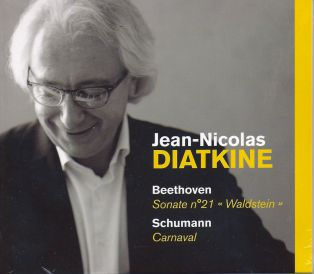Jean-Nicolas Diatkine (June 3 2014)

We recently launched a discography of Schumann’s Carnaval: we started listening to the beginning of forty versions and began to listen to the whole work of the selected versions: firstly Arrau, very impressive and then, an unknown pianist to me: Nicolas Diatkine and there I stopped as his interpretation seemed evident… We then found eachother on FB and I had the good fortune to meet him for lunch, a too short meeting as usual. An affable person, younger than the impression given by some published photos. His career is completely atypical: from Russian origins, his parents – renowned doctors – were born in France and saw at the beginning of a bad eye their son obvious inclination towards music: hearing him at 6 singing tunes from Don Giovanni can be scary! From 6 to 19 years, he took lessons from Wilfredo Voguet , who advised him especially not to attend Conservatories… He then worked with students from Rafael da Silva, repeater for Claudio Arrau, then in 1989 with Ruth Neye, professor at the Yehudi Menuhin School and the United Kingdom, and in 1994 with Narcis Bonet (1933*) , composer of Catalan origin , formed by Nadia Boulanger and Igor Markevitch . This is Ruth Neye who will take him in hand and lead him in a year and a half at international piano competition level. Jean- Nicolas Diatkine still felt lost considering interpretation: » I was a ‘weather’ pianist: my interpretation depended on the mood or of the weather, in the absence of assertive design » . Visiting Narcis Bonet, he played him among others the first Chopin Ballade, knowing that he had never been able to analyze satisfactorily its first eight measures. Narcis Bonet then asked him precisely he thought of these eight measures and eventually give him their senses. It was not until three years later in 1994, at age 30, that he decides to ask to take lessons with him. He had already played in concert as a soloist on numerous occasions since the age of 18 in 1982. It is during his meeting with Narcis in 1994 that the complete overhaul of his musical conceptions naturally obliged him to take a break from his solo career until 1999; instead, his career as an accompanist had well developed during this period; he recorded two discs with two singers in 1997. He will have previously been an accompanist in a singing school, which taught him for decoding scores and listening tosingers phrasings. In the meantime, he was noticed by the mezzo- soprano Alicia Nafé and tenor Zeger Vandersteene and accompanied them in many recitals in Europe. For him the search for authenticity is essential in music, « this is not a make. » He admits also feel increasingly strengthened listening to many young stars piano … Aside Arrau , of course, his pianistic pantheon includes Argerich, Busoni and Joseph Lhévinne . He is wary of the complexity displayed as a principle, as it may mask an emotional void: contemporary music, among others, sometimes wanders a little too much to his taste : invited to a conference on » music and light » at the Ecole Centrale de Lyon , he took as an example FeuerKlavier by Berio (wo he particularly admires), to demonstrate that there were as many effects of light in the Rondo in D Major by Mozart … His recitals are always built around a story as to parallel Brahms and Gaspar de la nuit as night music. Therefore do not miss his annual recital at Salle Gaveau on 12 November. Here last Schubert sonata and Sonnet de Prétrarque n°104 by Liszt :
